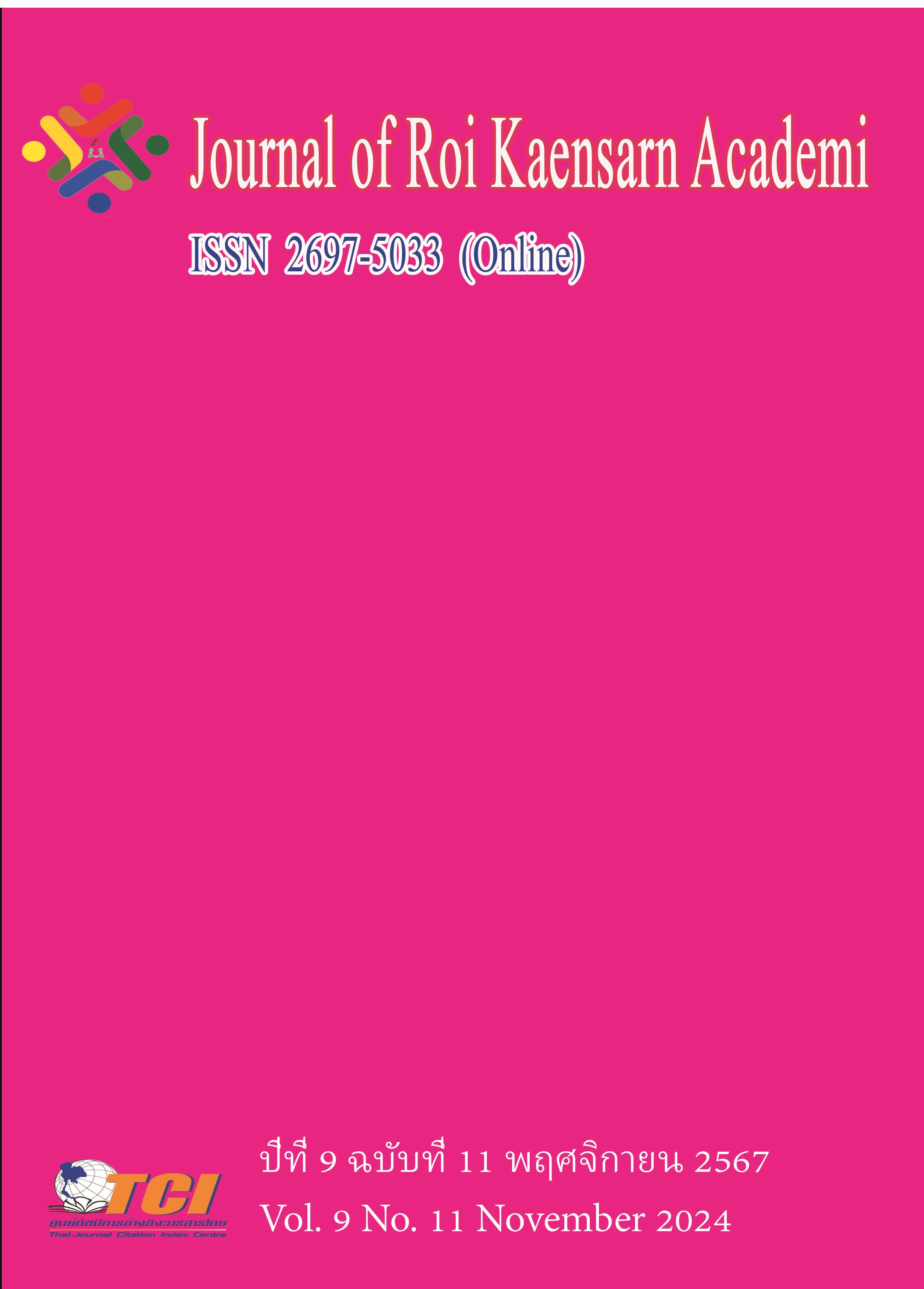การท่องเที่ยวเชิงอาหารกับการสร้างประสบการณ์ที่น่าจดจำผ่านงานเทศกาลอาหาร: การวิจัยเชิงเอกสารเพื่อเสนอกรอบแนวคิด
Main Article Content
บทคัดย่อ
งานวิจัยเชิงคุณภาพนี้มีวัตถุประสงค์เพื่อ 1) ศึกษาทบทวนวรรณกรรม แนวคิด ทฤษฎี บทความวิจัยเกี่ยวกับการท่องเที่ยวเชิงอาหารกับการสร้างประสบการณ์ที่น่าจดจำผ่านงานเทศกาลอาหาร 2) การประยุกต์ใช้ทฤษฎีพฤติกรรมตามแผนกับงานเทศกาลอาหาร และ 3) เสนอกรอบแนวคิดการศึกษาการสร้างประสบการณ์ที่น่าจดจำสำหรับนักท่องเที่ยวผ่านงานเทศกาลอาหาร โดยศึกษาผ่านการวิจัยเชิงเอกสารด้วยการค้นคว้าข้อมูลจากระบบฐานข้อมูลออนไลน์ เช่น บทความวารสาร รายงานประจำปี และวิทยานิพนธ์ที่เป็นภาษาอังกฤษและภาษาไทยที่เผยแพร่ตั้งแต่ปี ค.ศ. 1985 จนถึงปัจจุบันจำนวน 529 ชิ้น มีเกณฑ์คัดออกคือข้อมูลต้องไม่ใช่บทคัดย่อของบทความ งานวิจัยใช้เทคนิคการวิเคราะห์เนื้อหาและแก่นสาระโดยใช้โปรแกรม ATLAS.ti ในการวิเคราะห์ข้อมูล ผลการศึกษาพบว่า การศึกษาด้านการท่องเที่ยวเชิงอาหาร ส่วนใหญ่สนใจศึกษาเรื่องการจัดการอีเวนต์ (Event Management) การท่องเที่ยวเชิงอาหาร (Gastronomy Tourism) เทศกาลอาหาร (Food Festival) ประสบการณ์ (Experience) และทฤษฎีพฤติกรรมตามแผน (Theory of Planned Behavior) อย่างไรก็ตาม พบว่าการศึกษาเกี่ยวกับการจัดงานเทศกาลอาหารยังมีไม่มากนัก นอกจากนี้พบว่า งานด้านการประยุกต์ใช้ทฤษฎีพฤติกรรมตามแผนกับการจัดงานเทศกาลอาหาร (Food Festival) มีค่อนข้างน้อย ดังนั้นผลการวิจัยในครั้งนี้เผยให้เห็นถึงช่องว่างความรู้ของงานวิจัย (Research Gap) ด้านการท่องเที่ยวเชิงอาหาร การสร้างประสบการณ์ที่น่าจดจำ งานเทศกาลอาหาร และทฤษฎีพฤติกรรมตามแผน สำหรับผลการศึกษายังระบุตัวแปรตั้งต้นที่สำคัญรวมถึงเสนอกรอบแนวคิดในการสร้างประสบการณ์ที่น่าจดจำ งานเทศกาลอาหาร และทฤษฎีพฤติกรรมตามแผนสำหรับการศึกษาต่อยอดในอนาคตต่อไป
Article Details
เอกสารอ้างอิง
กรมอนามัย สำนักโภชนาการ. (2567). (ร่าง) แผนปฏิบัติการด้านโภชนาการแห่งชาติ ระยะที่ 1 (พ.ศ.2566-2567). ออนไลน์. สืบค้นเมื่อ 30 เมษายน 2567. แหล่งที่มา: https://resource.chemlinked. com.cn/food/File/draft-national-nutrition-action-plan-phase-1-2023-2027-version-submitted-to-the-national-food-board-consider.pdf
เจริญชัย เอกมาไพศาล, สิริพร เขตเจนการ, และสุพัฒนา เตโชชลาลัย. (2563). การศึกษาการบริโภคอาหารริมทางในกรุงเทพมหานครและผลกระทบต่อทัศนคติและความตั้งใจแสดงพฤติกรรมของผู้บริโภค. จุฬาลงกรณ์ธุรกิจปริทัศน์. 42 (1), 21-42.
จำเนียร จวงตระกูล และนวัสนันท์ วงศ์ประสิทธิ์. (2562). การวิเคราะห์เนื้อหาในการวิเคราะห์ข้อมูลการวิจัยเชิงคุณภาพ. วารสารสมาคมรัฐประศาสนศาสตร์แห่งประเทศไทย. 1 (2), 1-14.
ไชยยุทธ ปิ่นประดับ. (2561). ประวัติประเพณีกินผัก ภูเก็ต. ออนไลน์. สืบค้นเมื่อ 15 เมษายน 2567. แหล่งที่มา : https://www.phuketvegetarian.com/history/
ณนนท์ แดงสังวาลย์ และ ประสพชัย พสุนนท์. (2566). การจัดกลุ่มนักท่องเที่ยวตามคุณค่าเชิงประสบการณ์จากกิจกรรมการท่องเที่ยวเชิงอาหารในจังหวัดเพชรบุรี. วารสารวิทยาการจัดการปริทัศน์. 25 (1), 13-28.
ณัฐณิชา ตันสกุล. (2566). Gastronomy Tourism. ออนไลน์. สืบค้นเมื่อ 30 เมษายน 2567. แหล่งที่มา : https://www.dtn.go.th/th/file/get/file/1.2023090106281aa9b004fee63fd086d411e524cb105733.pdf
ภาณุวัฒน์ ภักดีอักษร และปทุมมาลัย พัฒโร. (2564). การวิเคราะห์ปัจจัยองค์ประกอบเชิงสำรวจของแรงจูงใจนักท่องเที่ยวต่างชาติเพื่อการท่องเที่ยวเชิงอาหารในจังหวัดภูเก็ตประเทศไทย. วารสารมนุษยศาสตร์วิชาการ. 15 (1), 1-27.
วีณา บารมี. (2564). ล้านนา ‘ล้ำ-‘ลำแต๊ๆ’. ออนไลน์. สืบค้นเมื่อ 30 เมษายน 2567. แหล่งที่มา: https:// onceinlife.co/lanna-gastronomy
ศิริภรณ์ แพรกจินดา. (2559). ปัจจัยที่มีอิทธิพลต่อความตั้งใจกลับมาร่วมงานเทศกาลอาหารทะเลซ้ำของผู้บริโภคในจังหวัดสมุทรสาคร. ปริญญาบริหารธุรกิจมหาบัณฑิต. บัณฑิตวิทยาลัย: มหาวิทยาลัยกรุงเทพ.
ศุภวรรณ ตีระรัตน์, เกิดศิริ เจริญวิศาล และ ศนินุช สวัสดิโกศล. (2564). มิติการสร้างคุณค่าแบรนด์ของงานแสดงสินค้าในประเทศไทยสู่การเติบโตเป็นแบรนด์ทรงพลังที่ได้รับการชื่นชอบ: มุมมององค์กรผู้จัดงานแสดงสินค้า. วารสารมหาวิทยาลัยคริสเตียน. 27 (4), 16-34
เอื้อมพร หลินเจริญ. (2555). เทคนิคการวิเคราะห์ข้อมูลเชิงคุณภาพ. วารสารการวัดผลการศึกษา มหาวิทยาลัยมหาสารคาม. 17 (1), 17-29.
B. Joseph Pine II and James H. Gilmore. (1998). WELCOME TO THE EXPERIENCE ECONOMY. HARVARD BUSINESS REVIEW. July-August. 97-105
Brigitte Smit. (2002). Atlas.ti for qualitative data analysis. Perspectives in Education. 20 (3), 65-76.
Hung-Che Wu and Chi-Han Ai. (2016). A study of festival switching intentions, festival satisfaction, festival image, festival affective impacts, and festival quality. Tourism and Hospitality Research. 16 (4), 359–384.
Jacks Soratto, Denise Pires, Susanne Friese. (2019). Thematic content analysis using Atlas.ti software: potentialities for researchs in health. Revista Brasileira de Enfermagem. 73 (3), 1-5
Jashim Uddin Ahmed. (2010). Documentary Research Method: New Dimensions. Indus Journal of Management & Social Science. 4 (1), 1-14.
Jin-Soo Lee, Choong-Ki Lee, and Youngjoon Choi. (2011). Examining the Role of Emotional and Functional Values in Festival Evaluation. Journal of Travel Research. 50 (6), 685–696.
J. Joseph Cronin, Jr., Steven A. Taylor. (1992). Measuring Service Quality: A Reexamination and Extension. Journal of Marketing. 56 (3), 55-68.
Jörg Hecker and Neringa Kalpokas. (2024). The Ultimate Guide to Qualitative Research -Part 2: Handling Qualitative Data 2024 Thematic analysis vs. content analysis. ATLAS.ti Scientific Software Development GmbH. Online. Retrieved April 20, 2024. From https://atlasti.com/guides/qualitative-research-guide-part-2/content-analysis-vs-thematic-analysis
Kübra Aşan, Kerem Kaptangil, Aysun Gargacı Kınay. (2020). Mediating role of perceived festival value in the relationship between experiences and satisfaction. International Journal of Event and Festival Management. 11 (2), 255-271
Landeshauptstadt München. (2024). The beer gardens at the Oktoberfest and in Munich You can not only enjoy your beer in the tent. Online. Retrieved April 20, 2024. From: https://www.oktoberfest.de/en/magazine/eat-and-drink/the-beer-gardens-at-the-wiesn-and-in-munich.
Meehyang Chang, Jung-Hoon Kim and Daecheol Kim. (2018). The Effect of Food Tourism Behavior on Food Festival Visitor’s Revisit Intention. Sustainability, 10 (2018), 1-15.
Mehmet Mehmetoglu and Marit Engen. (2011). Pine and Gilmore's Concept of Experience Economy and Its Dimensions: An Empirical Examination in Tourism. Journal of Quality Assurance in Hospitality & Tourism. 12 (4), 237-255
Monageng Mogalakwe. (2006). The Use of Documentary Research Methods in Social Research. African Sociological Review. 10 (1), 221-230
Parasuraman, A, Valarie A., Zeithaml and Leonard L. Berry. (1985). A Conceptual Model of Service Quality and Its Implications for Future Research. Journal of Marketing, 49 (4), 41-50.
Ramjit Singh, Mudasir Ahmad Mir & Adil Amin Nazki. (2024). Evaluation of tourist behavior towards traditional food consumption: validation of extended Theory of Planned Behavior, Cogent Social Sciences, 10 (1), 1-20.
John Scott. (1990). A matter of record: documentary sources in social research. (1st edition). Cambridge: Polity Press.
John Scott. (2006). Social Research and Documentary Sources. (1st edition). London: SAGE Publications Ltd.
Timothy Jung, M. Claudia Tom Dieck, Hyunae Lee and Namho Chung. (2016). Effects of Virtual Reality and Augmented Reality on Visitor Experiences in Museum. Publisher: Springer
Umit Sormaz, Halil Akmese, Eda Gunes, Sercan Aras. (2016). Gastronomy in Tourism. Procedia Economics and Finance. 39 (2016), 725-730
United Nations World Tourism Organization. (2017). UNWTO Tourism Highlights 2017 Edition. Online. Retrieved April 20, 2024. From : https://www.e-unwto.org/doi/pdf/ 10.18111/9789284419029

